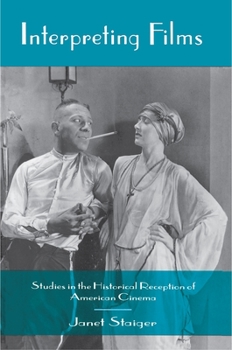Interpreting Films: Studies in the Historical Reception of American Cinema
Select Format
Select Condition 
Book Overview
Employing a wide range of examples from Uncle Tom's Cabin and Birth of a Nation to Zelig and Personal Best, Janet Staiger argues that a historical examination of spectators' responses to films can make a valuable contribution to the history, criticism, and philosophy of cultural products. She maintains that as artifacts, films do not contain immanent meanings, that differences among interpretations have historical bases, and that these variations are due to social, political, and economic conditions as well as the viewers' constructed images of themselves. After proposing a theory of reception study, the author demonstrates its application mainly through analyzing the varying responses of audiences to certain films at specific moments in history. Staiger gives special attention to how questions of class, gender, sexual preference, race, and ethnicity enter into film viewers' interpretations. Her analysis reflects recent developments in post-structuralism, cognitive psychology, psychoanalysis, and cultural studies, and includes a discussion of current reader-response models in literary and film studies as well as an alternative approach for thinking about historical readers and spectators.
Format:Paperback
Language:English
ISBN:0691006164
ISBN13:9780691006161
Release Date:March 1992
Publisher:Princeton University Press
Length:290 Pages
Weight:0.95 lbs.
Dimensions:0.8" x 6.0" x 9.0"
Customer Reviews
0 rating





